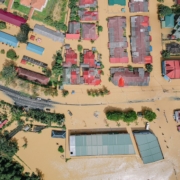IPCC 6AR Report: Our Analysis
The UN Intergovernmental Panel on Climate Change (IPCC) published the first part of its Sixth Assessment Report (6AR) today on the physical science of climate change. Further reports on adaptation and mitigation are due in Q1 2022.
6AR’s findings are arresting – more so when we appreciate that it represents wording moderated by what 60 countries could all agree. Each of the past four decades has been warmer than its predecessor. By 2020 we were already at 1.09°C of warming, and even in the best case scenario, the iconic 1.5°C will be reached by 2040 – and most likely around 2034. The Arctic is likely to be practically ice-free before 2050; already polar ice loss and glacial melting have caused a near tripling in the rate of sea level rise. Some changes are now irreversible, particularly those to the oceans, such as ice cap depletion, sea level rise, and the acidification and deoxygenation of the seas.
The restrained scientific language sounds apocalyptic, but the consequences – on which 6AR is largely silent – are more so. 6AR limits itself to physical science and does not expand on the impact on life. The changes to the oceans, chronicled by 6AR, imperil humanity by threatening the marine plants which produce over half the oxygen we breathe and by collapsing the ecosystems which support our fisheries. The unavoidable sea level rise to which “in the longer term” 6AR warns we are “committed”, means our least-bad outcome sees major cities such as Miami and Bangkok under water, and whole countries wiped off the map as oceans swallow island nations. Sea level rise alone will cause political turmoil and mass migrations, even before other aspects of the changing climate such as conflicts over water and other resources are considered.
Already we have seen extreme weather which scientists agree would have been “virtually impossible” without climate change: distortions to the jet stream, caused by the Arctic heating 3 times faster than the global average, have brought record-breaking and fatal extremes across the northern hemisphere, from heavy snow in southern Texas, to heatwaves and wildfires in northernmost latitudes, and flooding in Europe and China. These billion-dollar climate-driven impacts did not inform 6AR’s conclusions, as the data deadline was 1 January 2021 – but they ensure an attentive audience. With increases in the frequency and severity of unprecedented weather “virtually certain”, 6AR offers particularised regional information on climate’s impacts.
We do still have a chance to avert the worst impacts on the planetary systems on which our lives depend. “Immediate, rapid and large-scale reductions” in emissions are imperative, as natural carbon sinks become less effective and feedback loops intensify. This includes urgent cuts to methane (a by-product of decay, released both by human activities such as extractive industries and agriculture, and also through the impacts of global warming, such as melting permafrost and drying wetlands). The arithmetic is stark: a further 300 gigatonnes of carbon emissions is all that 6AR estimates we can afford to add to have a good chance of avoiding 1.5°C – for context, even 2020’s global industrial pause emitted 32 gigatonnes. At 500 gigatonnes, our odds are 50-50. Concerningly, such climate models were being re-appraised shortly before 6AR’s publication, as evidence mounted of impacts in 2021 which scientists had not expected to witness before 2090. Reassessments suggest that only modest warming takes us closer than we had realised to tipping points beyond which no amount of intervention can be effective.
The global consensus on the problem, as articulated in 6AR, is not reflected in agreement on the solutions. In a year in which both the Amazon and the Arctic tipped from carbon sinks to net sources, the “last chance” climate forum COP26 increasingly looks incapable of braking the nosedive. Coal is a key sticking point, as the single largest source of carbon dioxide emissions, and its consumption has “surged above pre-Covid levels” according to the IEA, “driven by Asia”. China’s consumption of coal increased in 2021, causing the price of Australian thermal coal to rise. India maintains that it is entitled to continue to burn coal to fuel its development, just as the wealthy nations did in causing the bulk of the problem; its delegation did not even attend preliminary talks recently, saying it had made its position clear at the G20. And while said wealthy nations are reducing their coal usage, it remains a non-negotiable part of the US economy and its significance to Poland holds back the EU’s wider green programme.
So often in negotiations, money is the infinitely flexible element that can bridge gaps between parties. However, developed nations have failed to mobilise the $100bn annual investment promised to poorer states by 2020. Three quarters of the $78.9bn provided is in the form of lending; the IMF was warning of spiralling debt in the developing world even before 2020’s “debt pandemic”. The Biden administration has noisily stormed the sliver of moral high ground exposed by China overtaking the US as the world’s greatest emitter. However, it has only promised $5.7bn – and in 2024, casting doubt on whether it will indeed emerge from the shadow of the presidential election. By contrast, the EU provided $24.5bn in 2019. The greater contrast, however, is between such public finance, and private: on a single day in July, two asset managers raised nearly $12.5bn for climate investments.
Averting systemic collapse will require levels of leadership, resourcing and agility which appear beyond the compromises of international relations, but corporates are already filling the vacuum. The IPCC explicitly called on investors and businesses, as well as governments, in launching 6AR. Private finance is increasingly the universal lubricant easing the sticking points which immobilise public policy. Companies across the developed world are leading climate initiatives; globalisation extends innovations into even carbon-wedded countries, and corporate networks of relationships amplify their impact across value chains. Financiers are engaging with shifting market forces away from incentivising consuming finite resources, destroying planetarily-critical habitats and emitting carbon.
Straddling the gap can be uncomfortable for commercial entities. Danone’s CEO was axed when its shareholders did not consider the company’s exemplary sustainability efforts to be supporting an ailing share price. However, the tide of shareholder sentiment has turned, with 2021 boardroom revolutions demanding more climate action, not less. Headline instances at ExxonMobil, Chevron and others are echoed in shareholder engagements amongst our own clients. The costs of inaction are increasingly apparent and must be reflected in corporate risk-management to protect shareholder capital.
Yet there are historic opportunities for companies which develop the technologies underpinning the largest industrial revolution since mechanisation. This too is evident in our advisory work, with individual clients investing over $100m in the transition, undeterred by governmental hesitancy. Regulation inevitably trails innovation: companies which do not allow their ambitions to be limited by the political context have always been those which have profited most. Never let a good crisis go to waste.




